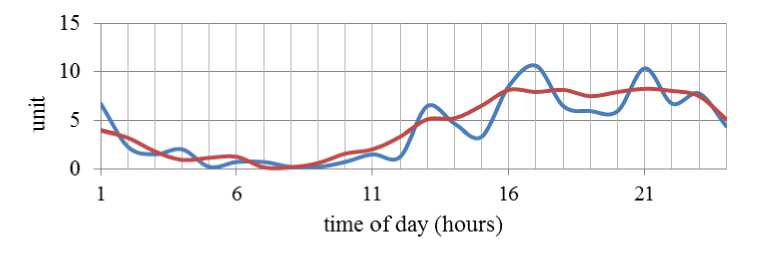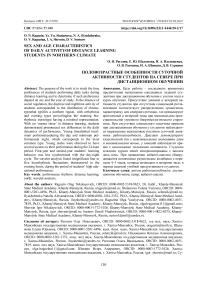Sex and age characteristics of daily activity of distance learning students in northern climate
Автор: Ragozin O. N., Shalamova Ye. Yu., Ilyushchenko N. A., Ragozina O. V., Shevnin I. A., Surinov D. V.
Журнал: Вестник Нижневартовского государственного университета @vestnik-nvsu
Рубрика: Экология человека
Статья в выпуске: 2, 2020 года.
Бесплатный доступ
The purpose of the work is to study the time preferences of students performing daily tasks during distance learning and to determine if such preferences depend on sex and the year of study. In the absence of social regulation, the daytime and nighttime activity of students corresponded to the distribution of chronotypesthat typifies a northern region, with arrhythmic and evening types prevailingbut the morning biorhythmic stereotype having a minimal representation. With no ‘master timer’ in distance learning, students demonstrated pronounced sex differences in the daily dynamics of performance. Young femaleshad maximum performanceduring the day and minimum performanceat night, which corresponds to the most common type. Young males were observed to have several ascents in their performance during the 24-hour period. First-year and second-year students’ learning behavior was less synchronized with the day-night cycle. The wavelet analysis found insignificant four to five hourrhythmic fluctuations thatoccurred in the evening hours, during the period of students’ high educational performance.
Performance rhythms, distance learning, north, wavelet-analysis
Короткий адрес: https://sciup.org/14117237
IDR: 14117237 | УДК: 57.024: | DOI: 10.36906/2311-4444/20-2/17
Текст научной статьи Sex and age characteristics of daily activity of distance learning students in northern climate
Students’ adaptation to studying at the university has always been challenging. The new social role implies that a student needs to develop new behavioral repertoireand seek opportunities to establish oneself in the new status. This process of gaining a foothold in the unfamiliar environment takes a long time, and it causes students anxiety and stress. Students’ activity decreases, and they may fail to adopt new behaviors and perform usual activities [7].
The adaptation process includes biological, social and psychological levels. The biological level is associated with acclimatization or with the genotype and selection of useful traits (distance runner, sprinter). The social level is associated with the socialization and the interiorizationof newgroup norms. The psychological level of adaptation is realized through decision making, manifestations of activity and expected results of actions [2; 5; 14].
The daily dynamics of human performance israther pronounced. As a rule,humans arehighly capable in the daytime but their performancedeclines at night. At the ‘warm-up’ phase, the performance is unstable and changes in waves; hence one can observe the instability of work actions and slight increas-es/decreases in the quantitative and qualitative characteristics of labor productivity. At the phase of sustainable performance, the productivity is stably high. At the phase of decreasing performance (fatigue), there appear tiredness, low motivation, a lack of interest in the current work, disturbance of the general sense of well-being, bad mood, erroneous actions, and the general deterioration of labor productivity [1; 16].
Distance learning at the universityis generating considerable interest [4; 9; 12], and it seems relevant to study the dynamics of mental performance in the absence of a ‘master timer’, such as a class schedule or a lesson plan, in distance learning. The purpose of this work is to study the time preferences of students performing daily tasks during distance learning and to determine if such preferences depend on sex and the year of study.
Participants, Materials and Procedure
Male and female students enrolled in the Khanty-Mansiysk State Medical Academy, Khanty-Mansiysk, Russia, participated in the study. The students could choose the time of study and rest themselves, with no actualclass schedule. The activity of distance learning students in time was investigated. Upon receipt of the students’ responses to daily tasks, the time of file arrivalto the professor’s computer was recorded.
In total, the arrival time of 1,374 files was analyzed, of which 386 were the completed tasksturned in by young males, and 988 byyoung females. The turned-in tasks belonged to the following courses:
-
- first-year course of anatomy , 200 by male students, 446 by female students, 646 in total;
-
- second-year course of normal physiology the students’ , 43 by male students, 192 by female students, 235 in total;
-
- third-year course of operative surgery , 82 by male students, 185 by female students, 267 in total;
-
- fifth-year course of hospital therapy (5 and 6 courses), 50 by male students, 104 by female students, 154 in total;
-
- sixth-year course of hospital therapy, 11 by male students, 61 by female students, 72 in total;
Thestudents’ responsesweredivided by sex and the year of study and entered into the database with time accuracy of one hour. The absolute number of responses was converted into relative indicators for comparison (conventional units). The study continued from 19 March to 30 April 2020.
Wavelet analysis was used to test the hypothesis of multiple cycles [13]. A wavelet is a mathematical function that allows analyzing frequency components of collected data. Signals are analyzed in the plane of wavelet coefficients (scale – time – level). The obtained wavelet spectrograms fundamentally differ from regular Fourier spectra in that they give a clear reference of a signal spectrum to time [6]. In this study, the periods of constant and insertion rhythms, their energy (amplitude) and significance were analyzed.
Results
First to sixth-yearmedicalstudentsdemonstrated sex differences of a qualitative nature in the daily learning activity (Fig. 1). The observation of the female students’ behavior produced a fairly smooth daily curve, with a decrease in the nighttime, minimum activity around 7–8 am, a non-steppedincrease in the daytime, and maximum activity from 4 pm to 10 pm.
To compare, the male students had periods of activity interrupted by episodes of inactivity. The surges in activity occurred at 11 am, 1 pm, 5 pm, 9 pm, and 11 pm. It should be noted that there were surges of night activity at 3–4 am.

f ig . 1. d aily activity of first to sixth-yearstudents in distance learning: – –male; – –female
The learning activity of junior and senior students by sex is shown in Figure 2 for females and Figure 3 for males. The both senior and junior female students demonstrated a noticeable activity completing educational tasks at night. The juniorfemale students were highly active throughout the day till the evening, while the senior femalestudents most often turned in the completed tasks at 11 am, 2 pm, 7 pm and 9 pm.

Fig. 2. Daily activity of first to third-yearfemale students and fourth to sixth-year female students in distance learning: – – senior; – – junor
The curveof the educational activity fluctuations in Figure 3 indicates that the senior male students mostly belong to arrhythmic and evening chronotypes. They demonstrated the inactivity in early morning hours, the eagerness to learn awakening around 10 am, leisurely work with breaks during the day, and going to bed around 11 pm. The junior male students were not synchronized to the day cycle, which was manifested by noticeable night activity and fluctuations in learning activity from 6 am midnight.

Fig. 3. Daily activity of first to third-year male students and fourth to sixth-year male students in distance learning: – – senior; – – junor
The wavelet analysis detectedinsignificant rhythmic fluctuationswith a period of 5.4 hours (p = 0.285) for female students and 4.3 hours (p = 0.182) for male students. They occurred in the evening hours during the period of high performance.
Discussion
The ability to maintain physical and mental performance is especially relevant during the period of high information load on students. The typical performance curve (Fig. 4) implies the lowest activity around 3–4 am [8]; the performance progressively increases reaching a maximum at 11 am and isfol-lowed by a noon abatement; another rise in activityhappens around 8–9 pm followed by a nightdecline.

1 6 11 16 21
time of day (hours)
Fig. 4. Daily fluctuations in performance according to Lifanov [8]
The obtained performance curves partially agree with Glybin’s [3] hypothesis (Fig. 5), according to which the human performance rhythm is determined by a single wave process with five physiological rises (5 am, 11 an, 4 pm, 8 pm, and 12 am) and the equal number of recessions (2 am, 9 am, 2 pm, 6 pm, 10 pm hours). The wavelet analysis in this study also indicated the presence of intraday cyclicality with a period of four to six hours.

Fig. 5. Daily physiological performance rhythms [3]
40 •
30 • 20 ■ 10 • О -10-JO. -30 -40-
In the absence of social regulation, the daytime and nighttime activity of students corresponded to the distribution of chronotypesthat typifies a northern region, with arrhythmic and evening types prevail-ingbut the morning biorhythmic stereotype having a minimal representation.
Conclusion
To summarize, with no ‘master timer’ in distance learning, students demonstrated pronounced sex differences in the daily dynamics of performance. Young femaleshad maximum performance during the day and minimum performance at night, which corresponds to the most common type. Young males were observed to have several ascents in their performance during the 24-hour period. First-year and second-year students’ learning behavior was less synchronized with the day-night cycle. The distribution of activity corresponds to the arrhythmic and evening chronotypes. The wavelet analysis found insignificant four to five hour rhythmic fluctuations that occurred in the evening hours, during the period of students’ high educational performance.
Список литературы Sex and age characteristics of daily activity of distance learning students in northern climate
- Asilderova, M. M., Agaragimova, V. K., Gasanguseynova, P. A., & Gasanova, B. M. (2016). Psychological indicators of adaptation of first-year students to training conditions in a higher education institution. The world of science, culture and education, 3(58), 74-76. (In Russian).
- Vishnevsky, K. S. (2014). Fiziologiya trudovykh protsessov. Moscow. (In Russian).
- Glybin, L.Ya. (1987). Vnutrisutochnaya tsiklichnost' proyavleniya nekotorykh zabolevanii. Vladivostok. (In Russian).
- Denisova, T. L. (2013 Pedagogical support of distance training of university students. Vestnik Buryatskogo gosudarstvennogo universiteta, (1), 173-177. (In Russian).
- Kozlov, D. V., & Ponomarev, V. V. (2006). Integrativnye formy povysheniya dvigatel'noi aktivnosti studentov v protsesse fizicheskogo vospitaniya v vuze. Vestnik KGU. Gumanitarnye nauki, (6(2)), 154-159. (In Russian).
- Kravchenko, V. F., & Churikov, D. V. (2018). Tsifrovaya obrabotka signalov atomarnymi funktsiyami i veivletami. Moscow. (In Russian).
- Kuznetsov, A. K. (2013). Dvigatel'naya aktivnost' studentov. In Konstruirovanie cheloveka: materialy XI Vseros. nauch.-prakt. konf. Tomsk. 277-281. (In Russian).
- Lifanov, E. V. (2006). Fiziologo-gigienicheskie aspekty trudovoi deyatel'nosti cheloveka. Volgograd.
- Marchuk, N. Yu. (2013). Psychological and pedagogical peculiarities of distance education. Pedagogical Education in Russia, (4).78-85. (In Russian).
- Molchanova, T. N., Gudkov, A. B., & Ragozin, O. N. (2009). Dynamics of some psychophysiological parameters discret constitutional types depending on the duration of adapting to the north. Human ecology, (5). 30-33. (In Russian).
- Molchanova, T. N., & Ragozina, O. V. (2009). Occurrence discrete types of constitution in genetically untied populations living in northern region. I.P. Pavlov Russian medical biological herald, (1).18-26. (In Russian).
- Ovcharov, A. V., & Moskalenko, E. V. (2017). The use of e-learning and distance learning technologies in higher educational institutions of the Altai Krai on the example of the Altai State Pedagogical University The world of science, culture and education, 4(65), 88-92. (In Russian).
- Ragozin, O. N., Bochkarev, M. V., Kosarev, A. N., Kot, T. L., & Tatarintsev, P. B. (2014). Programma "Issledovanie biologicheskikh ritmov metodom veivlet-analiza". Sv-vo o gos. registratsii programmy dlya EVM №2014611398, data registratsii 03.02 2014 g. (In Russian).
- Sadvakassova, N. A. (2018). Problem of mental workability in children. Scientific Review. Basic and applied research, (3). (In Russian). http://www.scientificreview.ru/ru/article/view?id=38
- Shalamova, E. Yu., Safonova, V. R., Bochkarev, M. V., & Kuz'menko, I. O. (2012). Effect of photoperiod on the performance of students - representatives of different chronotype. RUDN Journal of Medicine, (S7), 225-226. (In Russian).
- Shemetova, E. G., & Malgin, E. L. (2017). Dynamics of students' performance capability in the learning process. Philological Sciences. Issues of Theory and Practice, 2(68). 215-218. (In Russian).


